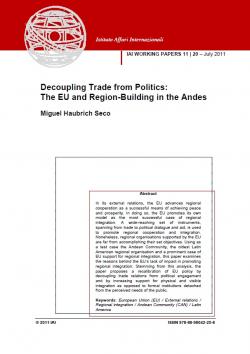Decoupling Trade from Politics: The EU and Region-Building in the Andes
In its external relations, the EU advances regional cooperation as a successful means of achieving peace and prosperity. In doing so, the EU promotes its own model as the most successful case of regional integration. A wide-reaching set of instruments, spanning from trade to political dialogue and aid, is used to promote regional cooperation and integration. Noneheless, regional organisations supported by the EU are far from accomplishing their set objectives. Using as a test case the Andean Community, the oldest Latin American regional organisation and a prominent case of EU support for regional integration, this paper examines the reasons behind the EU’s lack of impact in promoting regional integration. Stemming from this analysis, the paper proposes a recalibration of EU policy by decoupling trade relations from political engagement and by increasing support for physical and visible integration as opposed to formal institutions detached from the perceived needs of the public.
Presented at the seminar on "Promoting regional integration: lessons learned from EU-Latin America relations" organised within the framework of the EXACT project, Rome, 22 September 2011.
-
Details
Roma, Istituto Affari Internazionali, July 2011, 18 p. -
Issue
11|20 -
ISBN/ISSN/DOI:
978-88-98042-25-8
1. Introduction
2. The EU as an external federator? Instruments, aims and challenges
3. Between rhetoric and practice: The Andean Community’s pursuit of regional integration
4. The EU’s toolkit in action: A modest record so far
4.1. Negotiating the association agreement
4.2. Political dialogue
4.3. Technical and financial cooperation
5. Conclusion: Untying the knot by concentrating on substance
References



